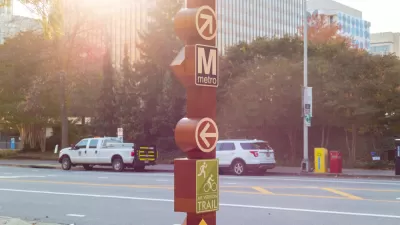A collection of media coverage since the decision examines how Arlington will achieve its goals now that it voted to end funding for a $333-million plan to build a 7.4-mile streetcar line down Columbia Pike.
Writing for the Washingtonian, Benjamin Freed describes the streetcar's political failure as the result of a "series of expensive misfires [that] spoiled the model suburb’s appetite for big, important projects." Freed, however, argues that due to the expected growth of residents in the county, Arlington "can’t afford to lose its nerve for big projects."
In a separate article for Leesburg Today, Owen Britton provides a dispatch from a November 19 forum on the future of Columbia Pike, in which two County Board members who voted to rescind the streetcar project, Jay Fisette and Libby Garvey, were on hand to begin the work of picking up the pieces from the failed plan. Britton's coverage quotes Mary Rouleau, who heads the Alliance for Housing Solutions, who "voiced concern that demise of the streetcar plan, and the economic development that had been anticipated with its arrival, could cause a crushing blow to efforts to retain affordable housing in the Columbia Pike corridor." Britton explains that "Arlington officials are aiming to retain the net 6,200 units of affordable housing on the Pike, largely through incentives to developers to provide additional affordable units in place of those that are sure to be razed."
Writing for CityLab, Eric Jaffe expresses optimism about the potential for a bus rapid transit line down Columbia Pike. In fact, reports Jaffe, Arlington already evaluated an "enhanced-bus line" as an alternative to the streetcar back in 2012. Jaffe details the differences in service and cost between the two proposals.
FULL STORY: Arlington Killed the Columbia Pike Streetcar, But It Still Has to Plan for the Future

Alabama: Trump Terminates Settlements for Black Communities Harmed By Raw Sewage
Trump deemed the landmark civil rights agreement “illegal DEI and environmental justice policy.”

Study: Maui’s Plan to Convert Vacation Rentals to Long-Term Housing Could Cause Nearly $1 Billion Economic Loss
The plan would reduce visitor accommodation by 25% resulting in 1,900 jobs lost.

Planetizen Federal Action Tracker
A weekly monitor of how Trump’s orders and actions are impacting planners and planning in America.

Waymo Gets Permission to Map SF’s Market Street
If allowed to operate on the traffic-restricted street, Waymo’s autonomous taxis would have a leg up over ride-hailing competitors — and counter the city’s efforts to grow bike and pedestrian on the thoroughfare.

Parklet Symposium Highlights the Success of Shared Spaces
Parklets got a boost during the Covid-19 pandemic, when the concept was translated to outdoor dining programs that offered restaurants a lifeline during the shutdown.

Federal Homelessness Agency Places Entire Staff on Leave
The U.S. Interagency Council on Homelessness is the only federal agency dedicated to preventing and ending homelessness.
Urban Design for Planners 1: Software Tools
This six-course series explores essential urban design concepts using open source software and equips planners with the tools they need to participate fully in the urban design process.
Planning for Universal Design
Learn the tools for implementing Universal Design in planning regulations.
Caltrans
Smith Gee Studio
Institute for Housing and Urban Development Studies (IHS)
City of Grandview
Harvard GSD Executive Education
Toledo-Lucas County Plan Commissions
Salt Lake City
NYU Wagner Graduate School of Public Service




























